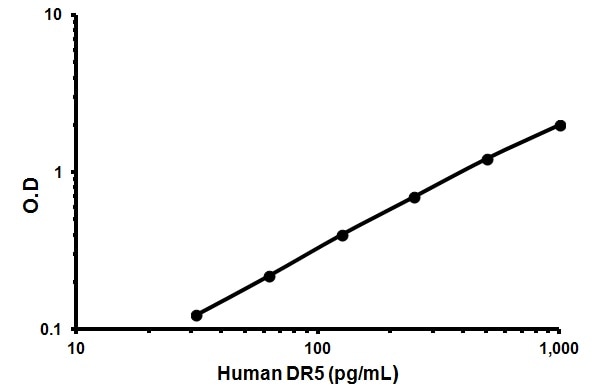Human DR5 ELISA Kit (CD262) (ab46013)
Key features and details
- Sensitivity: 6 pg/ml
- Range: 31.25 pg/ml - 1000 pg/ml
- Sample type: Cell culture extracts, Cell culture supernatant, Serum
- Detection method: Colorimetric
- Assay type: Sandwich (quantitative)
- Reacts with: Human
Properties
-
Storage instructions
Store at +4°C. Please refer to protocols. -
Components Identifier 1 x 96 tests 2 x 96 tests 10X Standard Diluent Buffer Black 1 x 15ml 1 x 25ml 200X Wash Buffer White 1 x 10ml 2 x 10ml Biotinylated Antibody Diluent Red 1 x 7ml 1 x 13ml Biotinylated anti-DR5 (CD262) Red 1 x 0.4ml 2 x 0.4ml Chromogen TMB Substrate Solution 1 x 11ml 1 x 24ml DR5 Microplate (12 x 8 well strips) 1 unit 2 units DR5 Standard (Lyophilized) Yellow 2 vials 4 vials HRP Diluent Red 1 x 12ml 1 x 23ml Stop Reagent Black 1 x 11ml 2 x 11ml Streptavidin-HRP 2 x 5µl 4 x 5µl -
Research areas
-
Function
Receptor for the cytotoxic ligand TNFSF10/TRAIL. The adapter molecule FADD recruits caspase-8 to the activated receptor. The resulting death-inducing signaling complex (DISC) performs caspase-8 proteolytic activation which initiates the subsequent cascade of caspases (aspartate-specific cysteine proteases) mediating apoptosis. Promotes the activation of NF-kappa-B. Essential for ER stress-induced apoptosis. -
Tissue specificity
Widely expressed in adult and fetal tissues; very highly expressed in tumor cell lines such as HeLaS3, K-562, HL-60, SW480, A-549 and G-361; highly expressed in heart, peripheral blood lymphocytes, liver, pancreas, spleen, thymus, prostate, ovary, uterus, placenta, testis, esophagus, stomach and throughout the intestinal tract; not detectable in brain. -
Involvement in disease
Squamous cell carcinoma of the head and neck -
Sequence similarities
Contains 1 death domain.
Contains 3 TNFR-Cys repeats. -
Cellular localization
Membrane. - Information by UniProt
-
Alternative names
- Fas like protein
- Apoptosis inducing protein TRICK2A/2B
- Apoptosis inducing receptor TRAIL R2
see all -
Database links
- Entrez Gene: 8795 Human
- Omim: 603612 Human
- SwissProt: O14763 Human
- Unigene: 521456 Human
- Unigene: 661668 Human




